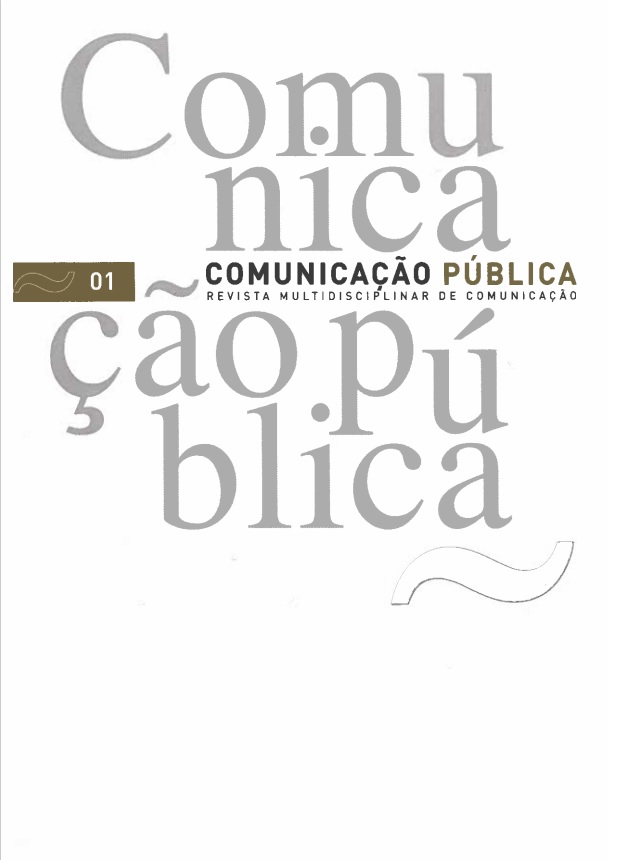Themes of war
exploratory study about thematic frames on television news about the war in Iraq
DOI:
https://doi.org/10.4000/cp.9792Keywords:
media and war, framing approach, thematic frames, Iraq warAbstract
In this paper we try to understand how the Portuguese public television channel framed the first phase of the last War in Iraq (first week). Through an empirical study based on some concepts and categories of the framing approach, we present a model to study the thematical frames in news television about war. This exploratory study shows how the military - strategic and tactical aspects - was the main thematical dimension explored by that television channel on the construction of the reality of war and the almost absence of the controversy around the reasons and legitimacy since the guns begun to talk.
Downloads
References
Bennett, W. L. & Paletz, D. L. (1994) Taken by storm. Chicago e Londres, The University of Chicago Press.
Charaudeau, P. [et al.] (2001) La Télévision et la guerre – déformation ou construction de la réalité ?. Bruxelas, Éditons De Boeck Université.
Clark, W. K. (2004) Vencer as guerras modernas – Iraque, terrorismo e o império americano. Mafra, Temas e Debates.
Couto, A. C. (1989) Elementos de estratégia. Vol. I, Lisboa, Instituto de Altos Estudos Militares.
Entman, R. (1993) Framing: toward clarification of a fractured paradigm. Journal of communication, 43 (4), pp. 51-58. DOI: https://doi.org/10.1111/j.1460-2466.1993.tb01304.x
Gamson, W. A. & Modigliani, A. (1992) Media discourse and public opinion on nuclear power: a constructionist approach. The american journal of sociology, vol. 95, nº1, pp. 1-37. DOI: https://doi.org/10.1086/229213
Gitlin, T. (1980) The whole world is watching. Berkeley e Los Angeles, University of California Press.
Goffman, E. (1976) Frame analysis. 3ª ed., Cambridge, Massachusetts, Harvard University Press.
Huntington, S. P. (1999) O choque das civilizações – e a mudança na ordem mundial. Lisboa, Gradiva.
Iyengar, S. e Simon, A. (1993) News coverage of the Gulf crisis and public opinion. Communication research, vol. 20, nº3, pp. 365-383. DOI: https://doi.org/10.1177/009365093020003002
McCombs, M. & Shaw, D. (2000 [1972]) A função de agendamento dos media. In Traquina, N. ed. O poder do jornalismo. Coimbra, MinervaCoimbra, 2000, pp. 47-61.
McCombs, M. & Shaw, D. (2000 [1993]) A evolução da pesquisa sobre o agendamento. In Traquina, N. ed. O poder do jornalismo. Coimbra, MinervaCoimbra, 2000, pp. 125-135.
Mesquita, M. (2003) O quarto equívoco – o poder dos media nas sociedades contemporâneas.Coimbra, MinervaCoimbra.
Santos, J. R. dos (2003) Em directo da guerra – o impacto da Guerra do Golfo no discurso jornalístico. Media & jornalismo, nº 3, 2º ano, CIMJ-Centro de Investigação Media e Jornalismo e MinervaCoimbra, pp. 23-28.
Scheufele, D. A. (1999) Framing as a theory of media effects. Journal of communication, 49 (1), pp. 103-122. DOI: https://doi.org/10.1111/j.1460-2466.1999.tb02784.x
Taylor, P. (1993) War and the media – propaganda and persuasion in the Gulf War. Manchester, Manchester University Press.
Tuchman, G. (1978) Making news. New York & London, The Free Press (1ª edição paperback: 1980).
Tumber, H. & Palmer, J. (2004) Media at war. Londres, Sage Publications.
Wolton, D. (1991) War game – l’information et la guerre. Paris, Flammarion.
Woodrow, A. (1991) Informação e manipulação. Lisboa, Publicações Dom Quixote.
Downloads
Published
Issue
Section
License
Copyright (c) 2005 Direitos de Autor (c) 2005

This work is licensed under a Creative Commons Attribution-NonCommercial 4.0 International License.
Os conteúdos da Comunicação Pública estão licenciados com uma licença Creative Commons - Atribuição-NãoComercial 4.0 Internacional.


